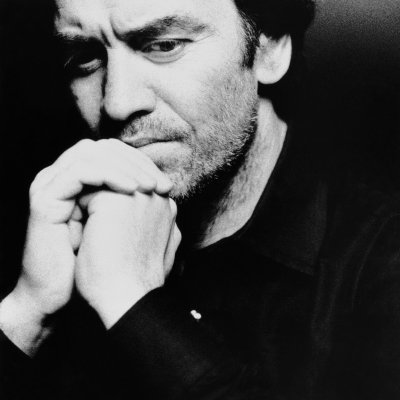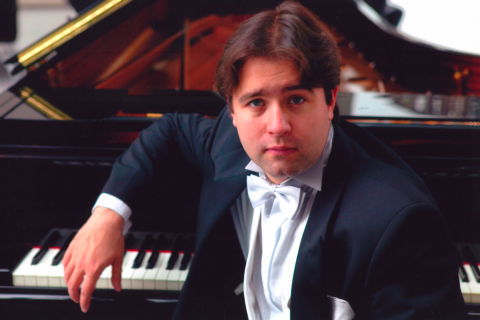|

Podium Celebrity
Valery Gergiev and the
Mariinsky Orchestra in Florida,
reviewed by LAWRENCE BUDMEN
Valery Gergiev, one of the world's most acclaimed conductors, has become a transatlantic podium celebrity. Indeed this dynamic Russian holds more artistic directorships than one can easily keep track of. While his conducting positions span Russia, Scandinavia, Europe and the United States, comparisons to the late Herbert von Karajan's unofficial title of 'general music director of Europe' are not inappropriate.

Valery Gergiev. Photo © Marco Borggreve
|
A Gergiev concert is a bona fide event and expectations were running high for his performance with the touring Mariinsky (formerly Kirov) Orchestra (presented by the Concert Association of Florida) on 6 November 2008 at the Knight Concert Hall, part of the Adrienne Arsht Center for the Performing Arts in Miami, Florida, USA. Gergiev and his St Petersburg based ensemble did not disappoint, offering high voltage music making in a program that spanned the versatile orchestra's symphonic, operatic and balletic repertoire.
The Cesar Pelli designed, wood paneled auditorium opened two seasons ago. After many decades of orchestral performances in Miami area halls that ranged acoustically from horrendous to barely adequate, the new concert venue offers live, vibrant sound. The bright ring of brass and percussion and the lower end bass response have vivid clarity. This is the kind of hall that makes any orchestra sound good. Top of the line ensembles excel in this horse shoe shaped space while second and third tier groups sound better than their normal performance capability. Despite a rather Spartan lobby, the Knight Concert Hall is a fitting memorial to Russell Johnson, the legendary acoustician whose care and expertise resulted in a superb performance space. (Concert halls from Birmingham, England to Dallas, Texas benefited from Johnson's magic touch.)
The Mariinsky ensemble is one of those quintessentially Russian bands with the kind of distinctive sound that has not been erased by musical globalism. Dark lower strings paint with lava-like tones while the tangy winds and stirringly blaring brass and whip crack percussion exude a unique aural image. Gergiev's virtuosic conducting blends flashes of exciting orchestral firepower with deeply felt, impassioned music making. This charismatic conductor now works without a podium or baton, leading his well honed group as first among equals.
Opening with a supremely lyrical reading of the Prelude to Wagner's Lohengrin, Gergiev exuded real affinity for the long arc of Wagner's musical utterance. The silky Mariinsky strings exhibited flawless unanimity and precision. Gergiev painted a soundscape of ethereal beauty and overwhelming intensity. Here was Wagnerian conducting of the first rank.
Gergiev was no less persuasive in Beethoven, molding a pliant, firmly vivacious orchestral fabric for Alexei Volodin's performance of the Piano Concerto No 4 in G major, Op 58. (The lustrous Mariinsky strings brought depth and strength not usually heard in performances by Western ensembles.) The 31 year old Volodin, First Prize winner of Zurich's Geza Anda Competition in 2003, is light years removed from the generic Russian firebrand type of keyboard artist. His finely calibrated rendition of Beethoven's most introspective piano concerto revealed a sensitive musician who emphasized the score's subtle interplay of sun and shadow rather than a flashy display of pianistic bombast.

Alexei Volodin
|
Volodin's flawless, rock solid technique dazzled the ear without the power pounding excess that too often impresses competition juries and audiences. His runs and triplets, often fudged or approximated by more established artists, were perfectly articulated, a stunning display of enlightened musicality and technical aplomb. Volodin was particularly impressive in a delicate, almost Chopinesque traversal of the Andante con moto; the mystery at the movement's conclusion beautifully revealed. A bright, suavely elegant reading of the Rondo: Vivace finale capped an impressive performance by a remarkably gifted young pianist.
The music of Sergei Prokofiev is a house specialty with Gergiev. He turned to the balletic side of this 20th century Russian icon with two scores separated by twenty years and wide stylistic leaps. A four movement suite from Le Pas d'Acier ('The Steel Steps') represented the modernist tendencies of the composer's Paris sojourn. Commissioned in 1926 by the Diaghelev Ballets Russes, this work depicts a Russian factory and its workers. A huge success in 1927, this score has disappeared from the repertoire. Grinding rhythms, wild dissonance and tonal ambiguity mark the machine-like angularity of this hard driving score. Comparisons to Stravinsky's Le Sacre de Printemps (also a Diaghelev commission) are not out of place. The Officials, the suite's second movement, stylistically alludes to Prokofiev's 2nd Piano Concerto, complete with folksy bassoon solo. In The Sailor and the Factory Worker, the composer hints at the melodic lyricism of his Romeo and Juliet ballet -- a preview of things to come. Gergiev pulled out all the stops for a super brilliant version of this astringent piece's orchestral high jinks.
By contrast, Suite No 3 from the 1946 ballet score Cinderella represents Prokofiev's lyrical side. Sweepingly balletic and sumptuously romantic, this music took soaring flight in the Mariinsky musicians' idiomatic performance. (It was a pleasure to hear this frequently neglected score rather than the often performed Romeo and Juliet which received no less than three different performances in the same Miami concert hall last season.) Gergiev chose to emphasize the score's darker subtext, unearthing refined subtleties and undertones that balance the stirringly regal theatricality of the music. The lush string textures and irrepressible effervescence of the opening Pavane -- the principal love theme -- set the mood with gleaming instrumental coloration. Gergiev's command of the score's lightning changes of mood was potently illustrated by the brilliance and orchestral razzle dazzle of the Oriental Dance and the ruminative, nostalgic beauty of the Slow Waltz. The Amoroso pas de deux for the Prince and Cinderella took wing in a lustrous wave of romantic enchantment, at once reflective and passionate. Concluding with the vivacious waltz and the ticking of the clock at midnight (from the ballroom scene), the orchestra's brass tolled the love theme one final time with brash insouciance.
Lengthy ovations led to high powered Gergiev encores -- an invigorating Hungarian March from Berlioz's Damnation of Faust and a sweeping, masterfully shaped traversal of the Prelude to Act III of Wagner's Lohengrin. Directing one of Russia's best ensembles, Gergiev remains an orchestral magician!
Copyright © 15 November 2008
Lawrence Budmen, Miami Beach, USA

|

